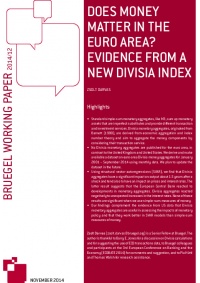Boz, Ε., Bussière, Μ. & Marsilli, C. (2014) “Recent slowdown in global trade: Cyclical or structural“, VoxEU Organisation, 12 November. The past three years have witnessed a slowdown in global trade. This column shows that the slowdown was particularly pronounced in advanced economies, especially the Eurozone. In a panel of 18 OECD economies, most of the slowdown can be explained by cyclical factors. However, structural factors – global value …Read More
Contagion in the European sovereign debt crisis
Glover, B. & Richards-Shubik, S. (2014) “Contagion in the European sovereign debt crisis“, VoxEU Organisation, 12 November. Understanding the probability and magnitude of financial contagion is essential for policymaking. This column applies a framework for modelling financial contagion to data on the cross-holding and credit risk of sovereign debt in Europe. Credit markets perceived little risk of contagion from these spillovers following a sovereign default. It is important for …Read More
What caused the great recession in the Eurozone? What could have avoided it?
Martin, P. & Philippon, T. (2014) “What caused the great recession in the Eurozone? What could have avoided it?“, VoxEU Organisation, 11 November. Economists disagree over the origin of the Eurozone Crisis. This column uses a quantitative framework to sort through the various channels and policy impacts. It argues that fiscal and macroprudential policies are complements, not substitutes. Prudent fiscal policy is helpful but cannot by itself undo private …Read More
Does Money Matter in the Euro area? Evidence from a new Divisia Index
Darvas, Ζ. (2014) “Does Money Matter in the Euro area? Evidence from a new Divisia Index“, Bruegel Working Paper 2014/12, 06 November. The purpose of this paper is to examine the possible role of money shocks on output and prices in the euro area. Since no Divisia monetary aggregates are available for the euro area, we first create and make available a database on euro-area Divisia monetary aggregates. We …Read More
Any hope that a revival of Spain’s housing market could help kick-start the country’s economy is likely to prove misplaced
Montalvo, J.G. (2014) “Any hope that a revival of Spain’s housing market could help kick-start the country’s economy is likely to prove misplaced“, LSE EUROPP, 06 November. Recent months have seen house prices in Spain rise for the first time in six years, after the housing sector was badly hit by the financial crisis. José García writes that one of the most damaging aspects of the crisis in Spain …Read More
The effect of immigration on public finances
Preston, Ι. (2014) “The effect of immigration on public finances“, VoxEU Organisation, 05 November. Data on social attitudes show that the perceived burden of immigration on a nation’s public finances is one of the strongest economic concerns associated with hostility to immigration. Yet recent official reports suggest an important positive role for immigration in the long-run health of public finances. This column argues that there can be no general …Read More
Reflections on the new ‘Secular Stagnation hypothesis’
Summers, L. (2014) “Reflections on the new ‘Secular Stagnation hypothesis’“, VoxEU Organisation, 30 October. The notion that Europe and other advanced economies are suffering secular stagnation is gaining traction. This column by Larry Summers – first published in the Vox eBook “Secular Stagnation: Facts, Causes and Cures” – explains the idea. It argues that a decline in the full-employment real interest rate coupled with low inflation could indefinitely prevent …Read More
Making sense of the comprehensive assessment
Acharya, V. & Steffen, S. (2014) “Making sense of the comprehensive assessment“, VoxEU Organisation, 29 Οκτωβρίου. The ECB conducted a comprehensive assessment of banks and identified capital shortfalls for 25 banks, totalling €25 billion. In this column, the authors provide a number of benchmark stress tests to estimate capital shortfalls. The analyses suggest possible capital shortfalls between €80 billion and more than €700 billion depending on the model. They …Read More
Income and Wealth Distribution in Germany: A Macroeconomic Perspective
Van Treeck, Τ. (2014) “Income and Wealth Distribution in Germany: A Macroeconomic Perspective“, The Institute Blog, 29 October. Household economic surveys, such as the German Socio-Economic Panel, notoriously underestimate the degree of income and wealth inequality at the upper end of the distribution. To combat this, a new approach developed by Thomas Piketty and co-authors analyzes tax return data in an attempt at better measuring top incomes and wealth. …Read More
A 100-year perspective on sovereign debt composition in 13 advanced economies
Ali Abbas, S. M., Blattner, L., De Broeck, M., El-Ganainy, A. & Hu, M. (2014) “A 100-year perspective on sovereign debt composition in 13 advanced economies“, VoxEU Organisation, 27 October. There has been renewed interest in sovereign debt since the Global Crisis, but relatively little attention has been paid to its composition. Sovereign debt can differ in terms of the currency it is denominated in, its maturity, its marketability, …Read More





